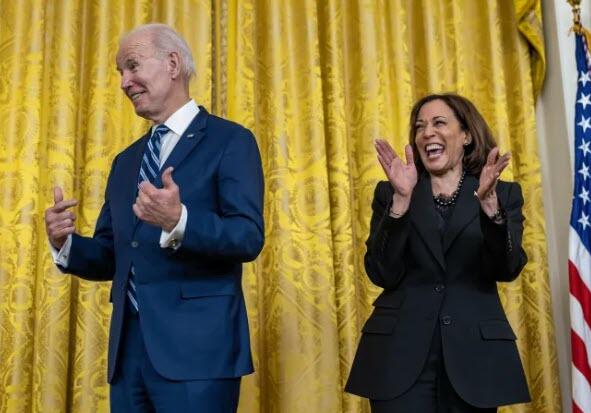The Harris Campaign Will Base Its Platform On Biden's Fake Economic Accomplishments
Authored by Connor O'Keefe via The Mises Institute,
Later this week, Kamala Harris is expected to break her campaign’s strange silence about policy by unveiling much of her economic platform. The vice president is scheduled to first join President Joe Biden for an event in Maryland on Thursday about “the progress they are making to lower costs for the American people” and then to deliver a speech about her own economic platform on Friday.
The Harris campaign clearly intends to continue spinning the Biden administration’s economic record as a success, and now to frame Harris as instrumental to that success. But the accomplishments that the president and vice president are set to celebrate this week are not real.
Biden and Harris entered office in January of 2021. The country was almost a year into the pandemic, and the economy was a disaster. President Donald Trump had abandoned any semblance of economic conservatism and ushered through two of the largest spending bills in U.S. history: the $2.2 trillion CARES Act in March of 2020 and a $900 billion Covid-related addendum to the annual omnibus spending bill in December of 2020 in addition to several other expensive measures and interventions.
The scale of government spending unleashed during Trump’s last year was unheard of, but was declared necessary because governors nationwide had shut down most of the economy in response to the virus. Production ground to a halt in the spring of 2020 for weeks, even months. The federal government flooded the economy with trillions of dollars — most of which were freshly printed by the Fed — to hide and delay the devastating economic impact of the lockdowns.
When Biden and Harris came into office in January of 2021, they quickly got to work expanding on what Trump had already done. In March of that year, they helped pass the $1.9 trillio
n American Rescue Plan Act.In the following months, the Administration then cooked up and passed an infrastructure law and the so-called CHIPS and Science Act. They then hit setbacks later in the year when the administration failed to secure enough votes for its flagship Build Back Better agenda, and then in mid-2022 when the country was slammed by the worst price inflation in half a century.
The price inflation was the obvious consequence of the government injecting trillions of new dollars into the economy at the same time government lockdowns were restricting production. But while that was the fault of both the Trump and Biden administrations, the American public understandably pinned most of the blame on the man currently in the Oval Office.
So the Biden administration and Congressional Democrats renamed Build Back Better as the Inflation Reduction Act, made a few changes, and passed it in August of 2022. In addition to all the Covid spending, the infrastructure law, CHIPS and Science Act, and the Inflation Reduction Act accounted for an additional $2 trillion in new government spending.
By flooding the economy with so much new cash, the government was able to hide most of the destruction wrought by the lockdowns.
And, because of the Fed’s low rates and heavy-handed interventions, the inescapable economic pain was delayed and exacerbated. But as the Biden administration and Federal Reserve learned in 2022, it couldn’t be delayed forever.
Inflation ravaged the American public. But it was only one part of the economic pain the federal government’s economic interventions have locked in. The artificially-low interest rates led businesses to start unsustainable lines of production that make a recession — or market correction — unavoidable.
Some economists have argued that we are already experiencing the recession, but that recent government spending and hiring has propped up GDP and jobs numbers enough to hide it so far.
In addition to the government’s Covid spending and monetary policy, the Biden Administration’s many interventions in the energy sector, automotive industry, and healthcare field — among others — have reallocated resources into the production of goods and services that consumers don’t actually want. That locks in even more economic pain.
This is one big economic disaster — much of which still lies ahead. And yet, tomorrow, the president and vice president apparently plan to again celebrate the situation they’ve helped put us in. By taking credit for every person who reentered the workforce after the pandemic and trotting out economic data propped up by government spending, the two will paint Biden’s term as an economic breakthrough that Harris will build on as the next president.
From a campaigning perspective, that is the story Harris needs to tell and the tone she needs to hit. But, like most of what’s said in a presidential campaign, it’s in no way grounded in reality.
via zer0hedge



No comments:
Post a Comment